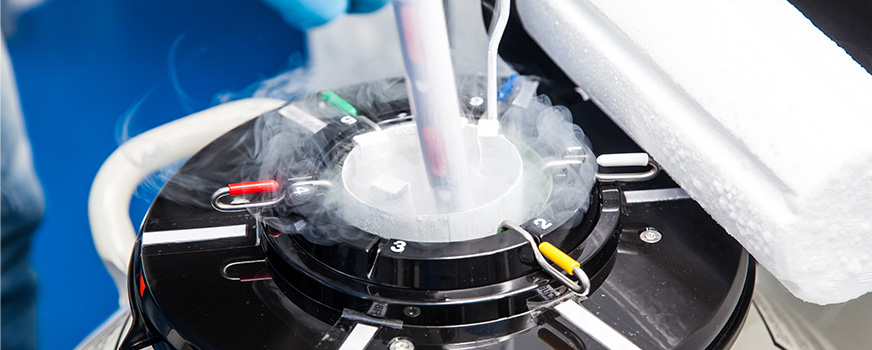Reproductive Preservation

Egg, Embryo, and Sperm Freezing
Reproductive preservation encompasses a range of medical techniques and procedures designed to safeguard an individual’s or couple’s fertility for the future. Whether facing medical treatments that may impact fertility, planning for parenthood at a later stage in life, or making choices in alignment with personal family planning goals, reproductive preservation offers a pathway to protect and optimize one’s reproductive potential. These methods can include egg, sperm, or embryo cryopreservation, and other innovative approaches that empower individuals to control their reproductive destinies.
Cryopreservation
Cryopreservation is the preservation of cells by subjection to extremely low temperatures. There are many different reasons why single individuals and couples decide to preserve their eggs, embryos, or sperm. Since fertility rates tend to decrease with age, some individuals/couples undergo this cryopreservation procedure to beat the human body’s biological clock.
Radiation and chemotherapy also have destructive effects on fertility, making it almost impossible for a person to conceive after the completion of their treatments. Before undergoing chemotherapy and/or radiation therapy, individuals often seek to undergo a cryopreservation procedure to increase the likelihood of having their own biological children. Egg, ovarian tissue, and sperm cryopreservation provide a significantly higher chance of conception for individuals/couples when they are ready to commit to having children and growing their family.
Egg Freezing (Oocyte Cryopreservation)
Oocyte Cryopreservation, commonly known as egg freezing, provides a proactive approach to fertility management, enabling women to preserve mature eggs for future pregnancy endeavors, whether they are navigating through a cancer diagnosis or simply electing to delay childbearing. As reproductive age significantly impacts egg reserve, this method offers a strategic option for those wishing to secure their potential to conceive in later life stages.
The egg preservation process, while straightforward, involves a series of steps beginning with 8-10 days of hormone treatments, followed by egg aspiration under anesthesia, and culminating in the freezing of eggs for up to 12 years. When the individual decides to pursue pregnancy, the eggs are thawed, fertilized via in vitro fertilization (IVF), and embryos are transferred into the uterus, navigating the path toward desired parenthood.
Embryo Freezing (Embryo Cryopreservation)
The Embryo Cryopreservation process, also known as “embryo freezing,” involves storing embryos at a very low temperature so that they can be thawed and used at a later time. An embryo consists of an egg and sperm that is already joined (or in other words, fertilized) and contains the genetic material from both the male and female parents. Embryos are more stable than the fragile eggs, leaving them less prone to damage during the freezing and thawing fertility process.
Embryo freezing can take place 1-5 days after fertilization. Typically, at Red Rock Fertility Center, we like to freeze the embryo during the blastocyst stage (day 5). The reason for this is because most chromosomally abnormal embryos will stop developing in culture and do not progress to the blastocyst stage, leaving the strongest embryos which will lead to a better chance of pregnancy.
Sperm Freezing (Sperm Cryopreservation)
Sperm Cryopreservation, or sperm freezing, is a pivotal service offered to men who seek to preserve their fertility for various reasons, such as impending testicular surgery, chemo, radiation therapy, or simply as a precaution due to age-related sperm quality decline. This process, which has successfully facilitated pregnancies even with sperm stored for up to 20 years, provides a safeguard for future family planning, ensuring that high-quality sperm is available when the decision to conceive is made.
Particularly for those contemplating a vasectomy, sperm freezing emerges as a prudent choice, considering the moderate success rates and potential quality issues with sperm post-vasectomy reversal. Utilizing frozen sperm, which has demonstrated comparable success rates to fresh sperm in IVF procedures, can circumvent potential future obstacles in fertility, providing a reliable path to parenthood when the time is right.
Determining & Understanding Your Options
A detailed discussion with Dr. Eva Littman is recommended to advise on which freezing option is best for each individual.
To learn more about our cryopreservation procedures or to schedule a consultation, please contact us or call (702) 749-4954 for more information.

About Us
Our Clinic
Our state-of-the-art facility is specially designed to better accommodate our growing patient base. The clinic, located at 9120 West Russell Road in Las Vegas, is 12,800 square-feet—twice the size of our former facility. The building, designed by Las Vegas architecture firm IZ Design Studio gives us the space and opportunity to better serve our patients.
Everything we do at Red Rock Fertility Center is aimed at providing patients with an unparalleled experience and the opportunity for the best chance of success. This new location gives us the tools to make this goal a reality for many more individuals seeking fertility treatment.